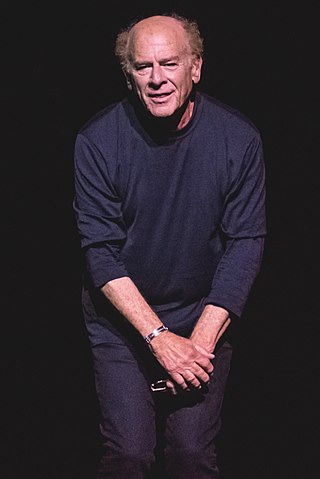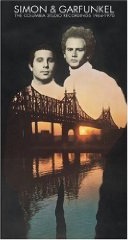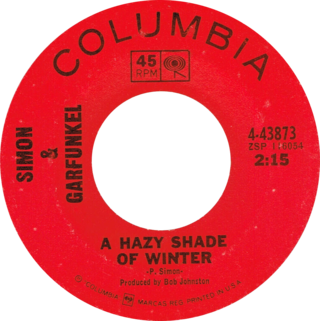Bridge over Troubled Water is a 1970 album by Simon & Garfunkel
Bridge over Troubled Water may also refer to:

Simon & Garfunkel were an American folk rock duo consisting of singer-songwriter Paul Simon and singer Art Garfunkel. They were one of the best-selling music acts of the 1960s. Their most famous recordings include three US number ones: "The Sound of Silence" (1965) and the two winners of the Grammy Award for Record of the Year, "Mrs. Robinson" (1968) and "Bridge over Troubled Water" (1970). Other hits include "The Boxer" (1969), "Cecilia" (1970) and the four 1966 releases "Homeward Bound", "I Am a Rock", "Scarborough Fair/Canticle" and "A Hazy Shade of Winter", as well as the 1968 album track "America".

Simon and Garfunkel's Greatest Hits is the first compilation album from Simon & Garfunkel, which was released on June 14, 1972, two years after Simon & Garfunkel had parted ways.

Paul Frederic Simon is an American singer-songwriter known for his solo work and his collaborations with Art Garfunkel. He and his school friend Garfunkel, whom he met in 1953, came to prominence in the 1960s as Simon & Garfunkel. Their blend of folk and rock, including hits such as "The Sound of Silence", "Mrs. Robinson", "America" and "The Boxer", served as a soundtrack to the counterculture movement. Their final album, Bridge Over Troubled Water (1970), is among the bestselling of all time.

Arthur Ira Garfunkel is an American singer, actor and poet who is best known for his partnership with Paul Simon in the folk rock duo Simon & Garfunkel. Born in Forest Hills, Queens, New York, Garfunkel became acquainted with Simon through an elementary school play, a production of Alice in Wonderland. Their combined presence in music began in the 1950s, and throughout the 1960s the duo of Simon & Garfunkel achieved great chart success with tracks such as "The Sound of Silence", "Mrs. Robinson", "Scarborough Fair", "The Boxer" and "Bridge over Troubled Water". The latter song's title also served as the name of Simon & Garfunkel's final album in 1970. Simon & Garfunkel split for personal reasons, but the pair have occasionally reunited in the years since. Both men experienced success in solo careers in the years following the duo's breakup.
The 13th Annual Grammy Awards were held on 16 March 1971, on ABC, and marked the ceremony's first live telecast. They recognized accomplishments by musicians from the year 1970. The ceremony was hosted for the first time by Andy Williams.

"Bridge over Troubled Water" is a song by the American folk rock duo Simon & Garfunkel, released in January 1970 as the second single from their fifth studio album, Bridge over Troubled Water (1970). It was written by Paul Simon and produced by Simon, Art Garfunkel and Roy Halee.

Live 1969 is the fourth live album by Simon & Garfunkel, released through Columbia Records. It consists of live recordings captured on the duo's final North American tour, prior to the release of their Bridge over Troubled Water album. Fifteen of the album's seventeen tracks are previously unreleased, with the exceptions being the live versions of "For Emily, Whenever I May Find Her" and "Kathy's Song", both of which initially appeared on Simon & Garfunkel's 1972 Greatest Hits album.
"Mother and Child Reunion" is a song by the American singer-songwriter Paul Simon. It was the lead single from his second studio album, Paul Simon (1972), released on Columbia Records. The song reached No. 4 on the Billboard Hot 100 chart in March 1972.

The Columbia Studio Recordings (1964–1970) is the third box set of Simon & Garfunkel recordings, released in 2001 by Columbia Records. This 5-CD set contains all of their studio albums from 1964 to 1970. The CDs are packaged in miniature recreations of the original LP jackets, and an annotated booklet is also included.

"The 59th Street Bridge Song (Feelin' Groovy)" is a song by folk rock duo Simon & Garfunkel, written by Paul Simon and originally released on their 1966 album Parsley, Sage, Rosemary and Thyme. Cash Box called it a "sparkling, spirited lid".
"The Only Living Boy in New York" is a song written by Paul Simon and performed by Simon & Garfunkel. It is the eighth track from the duo's fifth and final studio album, Bridge over Troubled Water. The song was also issued as the B-side to the duo's "Cecilia" single.

"Cecilia" is a song by American musical duo Simon & Garfunkel. It was released in April 1970 as the third single from the duo's fifth and final studio album, Bridge over Troubled Water (1970). Written by Paul Simon, the song's origins lie in a late-night party, in which the duo and friends began banging on a piano bench. They recorded the sound with a tape recorder, employing reverb and matching the rhythm created by the machine. Simon later wrote the song's guitar line and lyrics on the subject of an untrustworthy lover.

Old Friends is the second box set of Simon & Garfunkel songs, released in November 1997. The three-disc anthology collects most of the duo's best-known works, as well as previously unreleased outtakes. Some of these outtakes later appeared on the reissues of Simon & Garfunkel's five studio albums, as well as the subsequent boxed set The Columbia Studio Recordings (1964-1970).

"A Hazy Shade of Winter" is a song by American music duo Simon & Garfunkel, released on October 22, 1966, initially as a stand-alone single, but subsequently included on the duo's album Bookends (1968). It peaked at number 13 on the Billboard Hot 100.

"For Emily, Whenever I May Find Her" is a song written by Paul Simon and recorded by American music duo Simon & Garfunkel on their third studio album, Parsley, Sage, Rosemary and Thyme (1966). It is sung solely by Art Garfunkel, and consists mainly of his vocals with heavy reverb and a 12-string acoustic guitar. The lyrics concern finding a lover, although Simon once characterized the subject matter as being about a "belief," rather than about a specific individual.

Tales from New York: The Very Best of Simon & Garfunkel is a 40-track expanded version of The Best of Simon and Garfunkel compilation album, and the first 2-CD double album of greatest hits by the duo Simon & Garfunkel, released on March 28, 2000.

Bridge over Troubled Water is the fifth and final studio album by the American folk rock duo Simon & Garfunkel, released on January 26, 1970, by Columbia Records. Following the duo's soundtrack for The Graduate, Art Garfunkel took an acting role in the film Catch-22, while Paul Simon worked on the songs, writing all tracks except Felice and Boudleaux Bryant's "Bye Bye Love".

The Simon and Garfunkel Collection: 17 of Their All-Time Greatest Recordings is the second compilation album of greatest hits by Simon & Garfunkel, first issued in November 1981, 2 months after performing at the landmark The Concert in Central Park.

Bridge over Troubled Water is a 1970 studio album by Paul Desmond. It consists of songs recorded by Simon & Garfunkel and arranged by Don Sebesky.

Simon & Garfunkel: The Complete Albums Collection is the fifth box set of Simon & Garfunkel recordings. This 12-CD Set contains all five of their studio albums from 1964 to 1970, as well as the soundtrack album from The Graduate from 1968, the 1972 Simon and Garfunkel's Greatest Hits compilation album, and four previously released live concert recordings. The CDs are packaged in miniature recreations of the original LP jackets, and an annotated booklet is included.